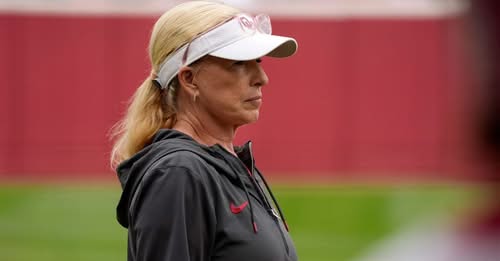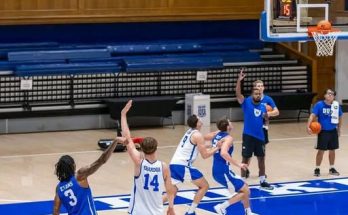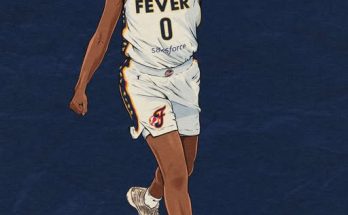In the pressure-packed world of college athletics, success is rarely accidental. For the University of Oklahoma softball team and head coach Patty Gasso, reaching the Women’s College World Series (WCWS) is not simply a reward for talent—it’s the result of an unrelenting standard rooted in discipline, resilience, and a culture of accountability. As the Sooners gear up for another deep postseason run, Gasso makes it clear: their return to the sport’s biggest stage didn’t happen because things came easy. It happened because her players embraced the hard path.
“They want it,” Gasso said after clinching the team’s WCWS berth. “They want to be coached hard. They want to be challenged. They don’t shy away from it—and that’s what separates this group from others.”
That mindset, one where players invite rather than resist difficult coaching, has been the bedrock of Oklahoma’s championship DNA. While the headlines often highlight towering home runs, strikeouts in the clutch, or walk-off heroics, the true engine behind the program’s sustained success is the work done behind closed doors—hours of practice, film study, mental conditioning, and a no-nonsense approach to accountability. Gasso, now a legend in the sport, knows that greatness begins with grit, not glamour.
In an era when athlete empowerment and individual branding dominate collegiate sports, Gasso’s insistence on tough, sometimes uncomfortable coaching might seem out of step. But inside the Oklahoma softball program, it’s part of the identity. Gasso doesn’t apologize for pushing her players beyond their perceived limits. She views it as her responsibility—not just to mold better athletes but to develop women prepared to take on life’s challenges long after the last out is recorded.
What makes this season unique, Gasso explained, is not the statistics or win total, but how this group has taken ownership of their development. “This team has something special,” she said. “They don’t make excuses. They’re not looking to blame anyone or anything. They take responsibility for themselves, for their teammates, and for the jersey they wear. That’s how you get here.”
The Sooners’ road to Oklahoma City wasn’t without adversity. Injuries, slumps, and a deep national field of elite programs meant nothing was guaranteed. But while others may have crumbled or panicked under the weight of expectation, OU leaned in. The team’s veterans reinforced the culture to the younger players, and instead of coddling each other, they held one another accountable every step of the way.
There’s something undeniably powerful about a locker room that polices itself—not out of fear, but out of love and shared goals. Gasso has built a culture where the players are the enforcers of the standard. The coaching staff sets the tone, but it’s the athletes who echo it day in and day out. “When you have players who not only accept being coached hard but demand it from each other, you know you’re on the right path,” Gasso noted.
The results speak for themselves. A team that some believed would take a step back due to key departures instead reloaded with the same fierce intensity. Whether it was clutch hitting in regionals or shutdown pitching in the supers, Oklahoma found ways to win—not because it was easy, but because they were prepared for the hard.
Gasso isn’t interested in hearing about distractions. Whether it’s NIL deals, media obligations, or personal accolades, she’s made it clear that when players step onto the field, everything else gets left at the gate. Her players understand that. There’s a time and place for everything, but between the lines, it’s about execution and excellence.
That single-minded focus is not a coincidence; it’s intentional. Every drill, every practice session, every meeting reinforces the idea that nothing is given, everything is earned. Players are pushed to confront not just what they’re good at, but where they struggle. And in that struggle lies the transformation.
“This game will expose you,” Gasso has said many times. “It’ll show you where you’re weak, where you’re not fully locked in. And our job is to make sure that when that happens, our players respond the right way.”
Respond they have. Time and again this season, Oklahoma has faced situations where lesser teams would’ve folded. Late-game deficits. Hostile road crowds. Critical errors. But instead of panicking, the Sooners leaned on their preparation and their trust in one another. That’s not luck. That’s not coincidence. That’s the byproduct of accountability.
At the heart of that accountability is an unshakable bond between Gasso and her players. While her coaching style is demanding, it’s never demeaning. The respect is mutual. Players know that every critique is meant to make them better. They trust that Gasso will be honest, even when it’s hard to hear. And that honesty, that unwillingness to sugarcoat the truth, is what helps unlock their full potential.
For players who stay in the program, the transformation is obvious. By the time they leave, they’re not just better players—they’re better people. Leaders. Competitors. Teammates who understand the value of sacrifice, communication, and unselfishness. Those lessons last far beyond their college careers.
Gasso has often spoken about the importance of coaching the person, not just the athlete. It’s why she remains such a revered figure in the sport. Her influence extends far beyond the diamond, and her former players often cite her as one of the most important figures in their lives. That impact doesn’t come from being nice. It comes from being real.
This season has only reinforced what Gasso already knew: players today aren’t afraid of tough coaching. They’re afraid of coaches who don’t care enough to tell them the truth. At Oklahoma, there’s no pretending. You earn your spot. You do your job. And when things go wrong, you take ownership.
That’s what makes the Sooners dangerous. It’s not just their talent—it’s their toughness. Their refusal to blame others. Their eagerness to improve. Their willingness to confront weaknesses instead of hiding from them. It’s a culture where excuses don’t survive and excellence is expected every day.
Now, as Oklahoma prepares to compete on the WCWS stage once again, Gasso isn’t changing a thing. The approach stays the same. The standard remains sky-high. The message is clear: if you want to wear the crimson and cream, you better be ready to work. You better be ready to be coached hard. And above all, you better be ready to be held accountable.
That’s how championships are won. Not with shortcuts, but with sweat. Not with comfort, but with challenge. Not with finger-pointing, but with ownership. For Patty Gasso and the Sooners, that’s not just a philosophy—it’s the foundation of everything.
So as the cameras flash, the fans cheer, and the WCWS spotlight shines down on Oklahoma once again, don’t be fooled into thinking this is all about talent. This is about character. This is about culture. This is about a team that looked hard coaching in the eye and said, “Bring it on.”
No excuses. Just excellence.



